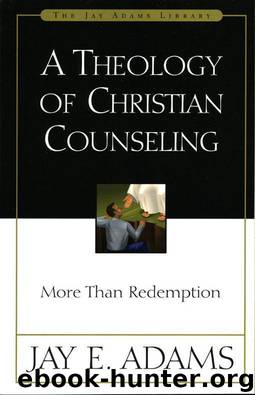A Theology of Christian Counseling: More Than Redemption by Jay E. Adams & Zondervan

Author:Jay E. Adams & Zondervan
Language: eng
Format: mobi
Tags: Religious Studies, Reference, Counseling & Recovery, Pastoral Counseling, Christianity, Theology, Clergy, Ministry & Evangelism, Religion & Spirituality, Christian Books & Bibles
ISBN: 0310511011
Publisher: Zondervan
Published: 2010-08-10T00:00:00+00:00
Command + Provision = Potential for change
Don’t worry 1. Directions: Matt. 6; Phil. 4 Work rather than worry
2. Strength: Phil. 4
Thirdly, God Himself is the Counselor Who guides and directs through His Word. The Christian counselor is not alone; for wisdom, principles, etc., he depends not on his own strength, but on the written, revealed will of God. Indeed, if a counselee doubts the truth of what the Christian counselor advises, he may (1) ask him to show him clearly the scriptural basis for the advice (at some point the counselor should do this—unsolicited—anyway), or (2) check out the scriptural teaching for himself (this is his obligation anyway, since it pleases God—Acts 17:11). Since there is a divinely revealed source of information equally available to both counselor and counselee, (1) the counselee ultimately isn’t dependent upon the counselor, and (2) he can monitor and evaluate the direction of counseling by following along in the Bible. Counseling that doesn’t carry conviction that it is biblical is deficient (even when its thrust is actually quite biblical); the counselee must be convinced that his decisions and actions are pleasing to God. It is not proper for him to view them merely as expedient.
Genuine Christian counselors not only accept the counselee’s interest in checking out everything biblically, but (like Paul) encourage it.5 When a Christian counselee sees for himself that his counselor adheres closely to biblical principle, this too brings hope. This hope grows out of the fact that Jehovah is a covenant-keeping God Whose promises are dependable. He is also a God Who cares for the people whom He has saved and made His own (the covenant slogan appears in several forms but always includes the essential elements: “Your God…My people”). In other words, hope, in Christian counseling, is the direct result of one’s salvation.6
Throughout earlier chapters, from time to time I have referred to the title of this volume—More Than Redemption—promising to explain it at length. It is here at last that I must fulfil my promise.
The facts to which that vital theme points provide the clearest view of the Christian counselor’s stance in counseling. This is true especially in relationship to the hope that grows out of salvation, about which I have been speaking. And, the hope to which I refer is not pie-in-the-sky-by-and-by (salvation does promise that, it is true), but a hope that also says, “You can start slicing right now!”
So far, I have mentioned three important reasons for genuine hope in Christian counseling. But there is one more that—as important as these three may be—excels them. In fact, it provides the basis for them, and for all other hope in counseling. In it lies the explanation of the Christian counselor’s hope; it is the truth signaled in the title, More Than Redemption.
First, let us be crisply clear about what the Bible means by the word hope. That word signifies far more than our pale approximation of that meaning in modern Western society. To us hope means “hope-so” (as in the fisherman’s response to the question, “Do you think you’ll catch any?”).
Download
This site does not store any files on its server. We only index and link to content provided by other sites. Please contact the content providers to delete copyright contents if any and email us, we'll remove relevant links or contents immediately.
The Secret Power of Speaking God's Word by Joyce Meyer(3144)
Signature in the Cell: DNA and the Evidence for Intelligent Design by Stephen C. Meyer(3117)
Real Sex by Lauren F. Winner(3000)
The Holy Spirit by Billy Graham(2932)
The Gnostic Gospels by Pagels Elaine(2515)
Jesus by Paul Johnson(2347)
Devil, The by Almond Philip C(2321)
23:27 by H. L. Roberts(2238)
The Nativity by Geza Vermes(2218)
Chosen by God by R. C. Sproul(2148)
All Things New by John Eldredge(2145)
Angels of God: The Bible, the Church and the Heavenly Hosts by Mike Aquilina(1948)
The Return of the Gods by Erich von Daniken(1924)
Angels by Billy Graham(1914)
Knowing God by J.I. Packer(1843)
Jesus of Nazareth by Joseph Ratzinger(1796)
The Gnostic Gospel of St. Thomas by Tau Malachi(1778)
Evidence of the Afterlife by Jeffrey Long(1773)
How To Be Born Again by Billy Graham(1771)
